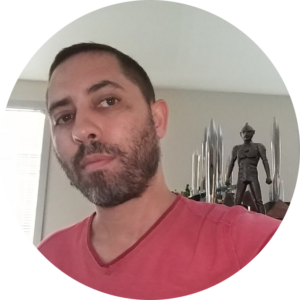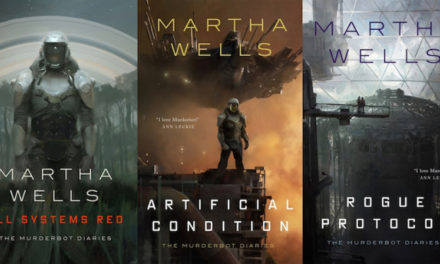The Mister Rogers of Speculative Fiction
Arley Sorg on Editing and Working in the Speculative
Issue 13: QTPOC | 2,609 words
Arley Sorg is co-Editor-in-Chief at Fantasy Magazine and a 2022 recipient of Science Fiction and Writers of America’s Kate Wilhelm Solstice Award. He is also a 2021 World Fantasy Award Finalist, a 2022 Locus Award Finalist, and a finalist for two 2022 Ignyte Awards for his work as a critic as well as for his creative nonfiction. Arley is senior editor at Locus Magazine, associate editor at both Lightspeed and Nightmare, and a columnist for The Magazine of Fantasy & Science Fiction. He ta kes on multiple roles, including slush reader, movie reviewer, and book reviewer, and conducts interviews for multiple venues, including Clarkesworld Magazine and his own site arleysorg.com. He has taught classes and run workshops for Clarion West, Augur Magazine, and more, is scheduled to be a guest at both Cascade Writers and the Odyssey Writing Workshop, and has been a guest speaker at a range of events. Arley grew up in England, Hawaii, and Colorado and studied Asian Religions at Pitzer College. He lives in the San Francisco Bay Area and writes in local coffee shops when he can. Find him on Twitter @arleysorg. Arley is a 2014 Odyssey Writing Workshop graduate.
kes on multiple roles, including slush reader, movie reviewer, and book reviewer, and conducts interviews for multiple venues, including Clarkesworld Magazine and his own site arleysorg.com. He has taught classes and run workshops for Clarion West, Augur Magazine, and more, is scheduled to be a guest at both Cascade Writers and the Odyssey Writing Workshop, and has been a guest speaker at a range of events. Arley grew up in England, Hawaii, and Colorado and studied Asian Religions at Pitzer College. He lives in the San Francisco Bay Area and writes in local coffee shops when he can. Find him on Twitter @arleysorg. Arley is a 2014 Odyssey Writing Workshop graduate.
——————–
LP Kindred: You are a co-Editor-in-Chief at Fantasy Magazine and a reader at Lightspeed, Senior Editor at Locus Magazine and regular contributor at The Magazine of Fantasy & Science Fiction and Clarkesworld. You have a lot of jobs and we all know you’re busy. Thank you for taking time to be interviewed for this very special issue of Speculative City.
Arley Sorg: Thank you so much for having me! I feel fortunate to be included.
LP: The writing world is huge. How did you find your way to the speculative? What were the earliest pieces that lured you to writing and editing?
Arley: I think I found my way to the speculative via a thick book of stories about Robin Hood. It was in some library, and I was very young—long before high school, probably eight or seven. The book was also dense, with tons of footnotes. But I loved it! Somehow it led me to books on mythology, which led me to science fiction and fantasy. We’ve always watched science fiction, fantasy, and horror in my family too, so that was no doubt a factor. In terms of writing, I think it was really about my mom, who was a fantastic writer. I have no doubt that if accessibility were different in her day, and if Black authors had been more commonly read and understood by publishing, that she would have been a widely celebrated (and controversial) author. Seeing her write these jarring, challenging stories that no one would ever read, it told me that this was something that maybe I could also do. Editing was all about being in the right place at the right time, and saying “YES!” when opportunities came up.
LP: I’ve had the good fortune of hanging out with you, most recently at DisCon III, host of Worldcon in 2022. You were present for FIYAH’s first Hugo as well as Octavia E. Butler’s first posthumous Hugo: triumphant moments for BIPOC writers, and Black writers specifically. There were also well-documented (micro-)aggressions along racial lines and biases against queer folks. Do you think these instances were unique to Worldcon or are they a microcosm of the speculative community as a whole?
Arley: I’m so glad I get to rant! Okay. I definitely think these things reflect our (meaning specifically the United States, but to an extent this should include the UK, Australia, etc.) larger culture. For example, let’s talk about Racism! The US is populated by racists of so many flavors and degrees, from the ones who would do you physical harm if they can get away with it (and they often do), to the ones who just won’t hire you (and you know in your gut why but can’t prove it), to the ones who give you compliments honestly not realizing that what they are saying is racist (but they think they are being nice, and usually, if you point out to them that what they said is problematic, they want to argue with you), and so on.
Everything about our culture reflects this racism, including the fact that as a nation, we let it continue, we come up with excuses as to why it’s okay to do nothing meaningful about it. In fact, as a nation, we can’t even agree to be honest and forthcoming about our set of national heroes. The recent thing with the Thomas Jefferson Monticello tour is an example, from the reaction of a certain conservative news show “woke shaming” people for telling the truth in the actual spot where terrible things happened, to the reaction of folks on both sides commenting about it afterwards; some said that simply relaying facts is not “woke,” and others said that the facts should be hidden, even in the place where they occurred, to not mar the idealization of the “hero.”
Since the speculative community is essentially comprised of a random selection of people from all over, of course this will include an array of racists. What I witnessed and heard about at Worldcon is pretty much the way it’s been at most conventions I’ve been to. What is unusual about Worldcon is, perhaps, a desire on the part of some of the individuals involved to do something about it; there are many conventions that still just deny there’s a problem, or if they acknowledge the problem, they won’t do anything about it. At the same time, I personally think the only way to deal with the racism in the speculative community is twofold: one, educate people more, so that they know what racism is in all its variations; two, have a “no tolerance” policy, so that not only do racists not feel safe being racist, they are actually, in fact, not safe being racists. As long as people don’t understand what racism is and all the ways it can happen, it won’t change. As long as people feel safe doing racist things at conventions, guess what? They will continue to do racist things at conventions.
LP: You’ve lived in England, Hawaii, Colorado, Southern California, the California Central Coast, and now the Bay Area. What do you think draws people and stories to cities?
Arley: I think it varies a bit person to person, but I think for me, and maybe for many others, it’s about possibilities and, to a degree, energy. Cities are vibrant hubs of possibilities with multitudes of directions, choices, lives, flavors. Each area of a city is something different, around each corner is a different fate. The possibilities of various relationships increase with the size of the city. The kinds of dangers, the kinds of people, and everything happening all around you all at once. Architecture—cities can be visually expressive things, they rise up in all their angles and shapes and shadows. I think for some it can also be about the sense of history—I know I feel that way when I go to a city that’s been around for a long time, and engaging with that history really ignites my imagination.
LP: You might be the hardest working man in SFFH and you’re only approaching your first decade in the field. What changes have you seen over the past ten years, and what changes do you look forward to in the next ten?
Arley: There are always new, sparkly ideas coming out, as well as styles and formats for delivering a narrative. Magazines rise and fall, publishing houses shift, notable figures appear and others vanish. But the authors featured on the 2012 Hugo Awards list, with only a couple of exceptions, were all white folks. Of the very few people of color, there was only one Black author. In fact, the first Black author to win a Hugo for Best Novel was N.K. Jemisin in 2016. The 2022 Hugo list features far more people of color, including more Black authors, and, importantly, Black authors in notable categories. What has changed over the last ten years is that authors of color, including Black authors, have better chances of landing on major genre awards lists (going back farther than ten years, there was little to no chance at all, especially in the Best Novel categories), and they have more books and stories out than they did ten years ago. Gender disparity has shifted in a similar way. This doesn’t mean we’ve reached equality; it just means that people of color aren’t as hard to find as they were in the past. Ditto women, trans authors, nonbinary authors, and more. Some people are upset that the white streak has been broken. I mean, think about it: over 50 Hugo Awards for Best Novel going out to white folks, and then a few Black folks grab up some rockets. This isn’t anywhere close to equality, and if it upsets you, then you are racist.
LP: Your job means you read a lot! And you always have insightful commentary on the work you love. What books have blown you away so far in 2022 and which are you dying to read before the year’s over? Extra points for work by QTPOC and city-centered books!
Arley: Well you can’t get much more city-centered than N.K. Jemisin’s The City We Became. Okay, okay, it came out a couple of years back, but it should be read by more people, even if a lot of people have already read it! I read a lot of anthologies these days, and I’m looking forward to Africa Risen, Voodoonauts collective’s (Re)Living Mythology, L. Penelope’s The Monsters We Defy—which is more city-centric than the others, located specifically in a well-researched 1920’s Washington DC. Books I’ve already enjoyed, and that more people need to know about, include anthologies Disruption from Catalyst Press and Unlimited Futures from Fremantle Press, as well as Trouble the Waters from Third Man Books.
LP: I’ve coined the title “the Mister Rogers of Speculative Fiction” in reference to you, whether you like it or not. #SorryNotSorry. I’ve seen numerous comments saying how your words of encouragement have helped people push through and return to the page or submissions or query trenches. Where did this benevolent activism come from?
Arley: Part of it comes from a guy named John Pitts, who wrote as J.A. Pitts. He was kind to me at my first Worldcon. He showed me around, introduced me to people, and essentially taught me what our community could be like through his actions. Part of it comes from moving through different spaces and having all those negative experiences, including the depression from rejection, self-doubt, being at some event and seeing everyone talking with each other and feeling like there is no way in, and more. Part of it is just my core belief: kindness makes the world better, makes communities stronger, makes life worth living. Happiness is found through shared experiences, through friendship. We learn more about the world and ourselves by spending time with people who aren’t exactly like us and by appreciating who they are.
LP: As an editor, what’s some advice you have for emerging and mid-career short story writers? Asking for a friend…
Arley: It’s most important to just keep writing. Even if you (oh, unknown short story writer) stop for a while, come back to it at some point. It can be difficult and emotional, especially for folks with any kind of marginalization, but you have to keep going. Next is to hone your craft. We live in a culture of credentials, where we feel it’s important to be seen as experts, as someone who knows what they are doing. But the writers who are always learning new things and challenging themselves are usually the ones putting out the best work. You can’t learn new things if you convince yourself that you already know everything and there’s nothing to learn. I think the last thing I want to mention is to have the right kinds of goals. “Right” goals are things that are within your control. For example, you have no control over how many sales you get in a year because you can’t control what decisions the editors make. You can control how many stories you write, and you can control how many submissions you are making. Find the right numbers that work for you; for example, writing a story a month and submitting five stories a month (whatever the right numbers are for you). You can make a goal to go to a convention, but you can’t make a goal to meet up with anyone in particular, because you don’t know if they will meet with you. But, you can have a goal to go to an event or panel and see someone speak and to try to chat with them later. Set goals, celebrate successes, and share your ups and downs with your support group (this is also important—have a support group! Friends, family… okay, so I snuck in an extra!).
LP: And if you could grant three short story writers a novel deal, based entirely on your love of their short work, who would you gift?
Arley: Probably Shingai Njeri Kagunda, Eden Royce (who has a book out but deserves another), and either Tenea D. Johnson or Kim Fu. There are a few other names I can think of… but we’ll leave it at that.
LP: Your skin glows. Like, literally. How? What is your skincare routine?!?! (Yes, this is entirely irrelevant as a question and women get asked all kindsa irrelevant questions like this when interviewed all the time. Also, I want to know!)
Arley: hahaha! Thank you! It comes from eating the hearts of racists! At first it just gives you strong nails and hair, but after a while the benefits grow!
LP: You’re doing so much so I’m scared to ask, but what’s next for you?
Arley: I just taught at Cascade Workshop and did a couple of classes for Clarion West. I’m hoping to do more teaching. My most recent column in The Magazine of Fantasy & Science Fiction is about the usefulness of major awards, via a survey of recent awards nominees, and my next one (if it comes out) is about gender (and more!) as regards the Hugos and other major awards. More interviews with cool folks and so on. I’m hoping to get back to writing at some point… But the great thing about writing? It’s always there, when you’re ready to go back to it.
LP: Arley, thank you so much for chatting with us. It’s a blessing to sit with your insight and generosity. And I’m looking forward to my next hug.
Arley: Thank you so much for this! I appreciate your energy and thoughtful (and fun!) questions. I’m glad you’re in this.
LP: If you were to write a story for this issue of Speculative City, what would that story be about?
Arley: Off the top of my head… a gay city in space. I picture it as an uneven, massive, star-like cluster of metal inside a transparent globe, which subsists on solar energy and moves through space from star to star, existing for long stretches in the lonely cold— essentially holding its breath until it’s near collapse—as it searches for a love that may not exist, since there may be no other cities like it, or even remotely compatible partners.
LP: Thank you so much for taking time out to chat with me and for sharing with the world, Arley.
Arey: Thank you, LP!!! <3



